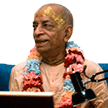Transcendental Form - an essential subject: Difference between revisions
(Created page with "Category:Essential Subjects <!----------------------- edit below this line -----------------------> <!------------------------ begin introduction text --------------------...") |
(Vanibot #0041: Moves Choose Another box to the end) |
||
| Line 2: | Line 2: | ||
<!----------------------- edit below this line -----------------------> | <!----------------------- edit below this line -----------------------> | ||
<!------------------------ begin introduction text ------------------------> | <!------------------------ begin introduction text ------------------------> | ||
With our present materialized senses we cannot perceive anything of the transcendental Lord. Our present senses are to be rectified by the process of devotional service, and then the Lord Himself becomes revealed to us. In the Bhagavad-gītā it is confirmed that the transcendental form of the Lord can be perceived only by pure devotional service. So it is confirmed in the Vedas that only devotional service can lead one to the side of the Lord and that only devotional service can reveal His transcendental form. In the Brahma-saṁhitā also it is said that the Lord is always visible to the devotees whose eyes have been anointed with the tinge of devotional service. So we have to take information of the transcendental form of the Lord from persons who have actually seen Him with perfect eyes smeared with devotional service | |||
Srila Prabhupada's books, lectures, conversations and letters offer a comprehensive presentation of this essential subject as seen in the Vaniquotes '''[[Vaniquotes:Category:Transcendental Form|Transcendental Form]]''' category. An introduction from his books is given below in the following | Srila Prabhupada's books, lectures, conversations and letters offer a comprehensive presentation of this essential subject as seen in the Vaniquotes '''[[Vaniquotes:Category:Transcendental Form|Transcendental Form]]''' category. An introduction from his books is given below in the following 10 quotes. | ||
<!-------- end introduction text and don't touch next three lines ---------> | <!-------- end introduction text and don't touch next three lines ---------> | ||
---- | ---- | ||
== Quotes from Srila Prabhupada's books == | == Quotes from Srila Prabhupada's books == | ||
<!----------------- edit quote boxes below this line -----------------> | <!----------------- edit quote boxes below this line -----------------> | ||
{{VaniQuotebox| | {{VaniQuotebox|Actually, at the present moment all systems of religion deny the worship of the form of the Lord due to ignorance of His transcendental form|Actually, at the present moment all systems of religion deny the worship of the form of the Lord due to ignorance of His transcendental form. The first-class materialists (the Māyāvādīs) imagine five specific forms of the Lord, but when they try to equate the worship of such imaginary forms with bhakti, they are immediately condemned. '''(Caitanya-caritāmṛta, Madhya-līlā 6.167)'''}} | ||
{{VaniQuotebox|All the Vedas worship the transcendental form of the Lord. In the Vedic mantras the devotees request the Lord to remove the glaring effulgence because it covers His real face. That is the version of the Isopanisad|The form of the Lord in any shape is always transcendental and full of knowledge and mercy. The Lord is the destroyer of all material contamination because His form is personified Vedic knowledge. All the Vedas worship the transcendental form of the Lord. In the Vedic mantras the devotees request the Lord to remove the glaring effulgence because it covers His real face. That is the version of the Īśopaniṣad. The Lord has no material form, but His form is always understood in terms of the Vedas. '''(Śrīmad-Bhāgavatam 3.13.26)'''}} | |||
{{VaniQuotebox| | {{VaniQuotebox|As spiritual beings, having eternal relations with that transcendental form of the Lord, we are, life after life, searching after that form of the Lord, and we are not satisfied by any other form of material appeasement|As spiritual beings, having eternal relations with that transcendental form of the Lord, we are, life after life, searching after that form of the Lord, and we are not satisfied by any other form of material appeasement. Nārada Muni got a glimpse of this, but having not seen it again he became perturbed and stood up all of a sudden to search it out. What we desire life after life was obtained by Nārada Muni, and losing sight of Him again was certainly a great shock for him. '''(Śrīmad-Bhāgavatam 1.6.18)'''}} | ||
{{VaniQuotebox| | {{VaniQuotebox|Because the Mayavadi philosophers do not accept the eternal transcendental form of the Supreme Lord, they are unable to engage in real devotional service|Because the Māyāvādī philosophers do not accept the eternal transcendental form of the Supreme Lord, they are unable to engage in real devotional service. Thus the Māyāvādī philosopher is forever bereft of Kṛṣṇa consciousness and Kṛṣṇa's devotional service. The pure devotee of the Personality of Godhead never accepts the Māyāvādī philosophy as an actual path to transcendental realization. The Māyāvādī philosophers hover in the moral and immoral material atmosphere of the cosmic world and consequently are always engaged in rejecting and accepting material enjoyment. '''(Teachings of Lord Caitanya, Chapter 25)'''}} | ||
{{VaniQuotebox| | {{VaniQuotebox|He has no material activities, nor has He a material form or name. Only in pure consciousness, Krsna consciousness, can one perceive the transcendental form of the Lord|The Lord, whose pure form sac-cid-ānanda-vigraha (Bs. 5.1) is uncontaminated by the modes of material nature, can be perceived by pure consciousness. In the Vedānta He is described as being one without a second. Because of His spiritual potency, He is untouched by the contamination of material nature, and because He is not subjected to material vision, He is known as transcendental. He has no material activities, nor has He a material form or name. Only in pure consciousness, Kṛṣṇa consciousness, can one perceive the transcendental form of the Lord. '''(Śrīmad-Bhāgavatam 5.19.4)'''}} | ||
{{VaniQuotebox| | {{VaniQuotebox|One should live at a place where the transcendental form of the Lord is worshiped|The best method is that one should live at a place where the transcendental form of the Lord is worshiped. The temple of the Lord is a transcendental place, whereas the forest is a materially good habitation. A neophyte devotee is always recommended to worship the Deity of the Lord (arcanā) rather than go into the forest to search out the Lord. Devotional service begins from the process of arcanā, which is better than going out in the forest. '''(Śrīmad-Bhāgavatam 1.6.21)'''}} | ||
{{VaniQuotebox|Persons who have no intelligence deride the transcendental form of the Lord as material|In the Caitanya-sampradāya there is sometimes a demoniac misconception about the descent of Nityānanda Prabhu. Nityānanda Prabhu's body is spiritual, but demoniac persons consider the body of the Supreme Personality to be material, just like ours. Avajānanti māṁ mūḍhāḥ: (BG 9.11) persons who have no intelligence deride the transcendental form of the Lord as material. '''(Śrīmad-Bhāgavatam 3.18.2)'''}} | |||
{{VaniQuotebox|The devotees of the Lord who are transcendental to the above-mentioned three modes of material nature can see the all-blissful transcendental form of the Lord with their vision of love in the attitude of pure devotional service|This misconception of the formlessness of the Supreme Personality of Godhead is due to the yogamāyā curtain of the Lord and can be removed only by the Supreme Will, as soon as the conditioned soul surrenders unto Him. The devotees of the Lord who are transcendental to the above-mentioned three modes of material nature can see the all-blissful transcendental form of the Lord with their vision of love in the attitude of pure devotional service. '''(Śrīmad-Bhāgavatam 2.5.20)'''}} | |||
{{VaniQuotebox|The spiritual forms in the transcendental world have nothing to do with the negative conception of formlessness. The conclusion is that a person is an agnostic when he does not agree to worship the transcendental form of the Lord|One should know that beyond this material nature is another nature, which is spiritual. Just as there are material forms in this material world, there are spiritual forms in the spiritual world. This is confirmed by all Vedic literature. The spiritual forms in the transcendental world have nothing to do with the negative conception of formlessness. The conclusion is that a person is an agnostic when he does not agree to worship the transcendental form of the Lord. '''(Caitanya-caritāmṛta, Madhya-līlā 6.167)'''}} | |||
{{VaniQuotebox|The very same transcendental form of the Lord is manifested by His internal potency, and the formation of His multifarious manifestations of incarnations is always of the same transcendental quality, without any touch of the mahat-tattva|The conception of the virāṭ-rūpa, especially for the impersonalist, is thus nondifferent from the eternal form of the Lord. This eternal form of the Lord exists prior to the creation of the mahat-tattva, and it is stressed here that the eternal form of the Lord is par excellence spiritual or transcendental to the modes of material nature. The very same transcendental form of the Lord is manifested by His internal potency, and the formation of His multifarious manifestations of incarnations is always of the same transcendental quality, without any touch of the mahat-tattva. '''(Śrīmad-Bhāgavatam 1.3.3)'''}} | |||
<!----------------- edit quote boxes above this line -----------------> | <!----------------- edit quote boxes above this line -----------------> | ||
| Line 31: | Line 38: | ||
'''Transcendental Form - [[Vaniquotes:Category:Transcendental Form|explore more within this category]]'''. | '''Transcendental Form - [[Vaniquotes:Category:Transcendental Form|explore more within this category]]'''. | ||
{{EsentialSubjectTotal}} | {{EsentialSubjectTotal}} | ||
<div style="float:left;"> | |||
{{EssentialSubjectnav}} | |||
</div> | |||
__NOTOC__ | __NOTOC__ | ||
__NOEDITSECTION__ | __NOEDITSECTION__ | ||
Latest revision as of 17:56, 22 November 2020
With our present materialized senses we cannot perceive anything of the transcendental Lord. Our present senses are to be rectified by the process of devotional service, and then the Lord Himself becomes revealed to us. In the Bhagavad-gītā it is confirmed that the transcendental form of the Lord can be perceived only by pure devotional service. So it is confirmed in the Vedas that only devotional service can lead one to the side of the Lord and that only devotional service can reveal His transcendental form. In the Brahma-saṁhitā also it is said that the Lord is always visible to the devotees whose eyes have been anointed with the tinge of devotional service. So we have to take information of the transcendental form of the Lord from persons who have actually seen Him with perfect eyes smeared with devotional service
Srila Prabhupada's books, lectures, conversations and letters offer a comprehensive presentation of this essential subject as seen in the Vaniquotes Transcendental Form category. An introduction from his books is given below in the following 10 quotes.
Quotes from Srila Prabhupada's books
Transcendental Form - explore more within this category.
Vanipedia has now over 903 introductory articles compiled from Srila Prabhupada's books under the series titled Essential Subjects. All these articles can be seen in the Table of Content on the right side of this article and also here in this Umbrella Category. Browse through them to relish the breadth and depth of Srila Prabhupada's teachings - There is a subject for everyone.









